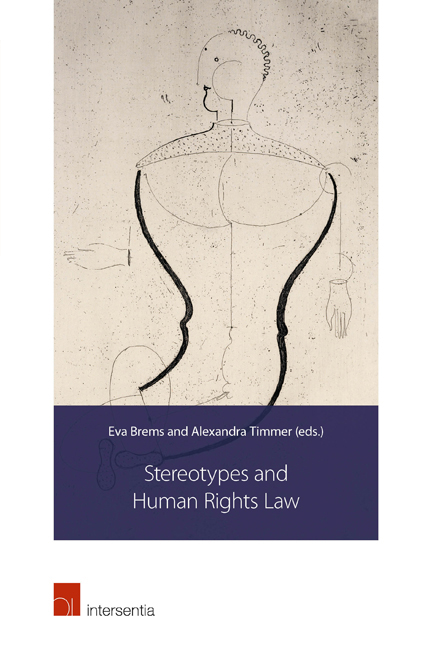Book contents
- Frontmatter
- Contents
- Introduction
- Building Momentum Towards Change. How the UN's Response to Stereotyping is Evolving
- Gender Stereotyping in Domestic Violence Cases. An Analysis of the European Court of Human Rights’ Jurisprudence
- Gender Stereotyping in the Case Law of the Inter‑American Court of Human Rights
- ‘My Sense of Humanity Has Gone Down the Drain’. Stereotypes, Stigma and Sanism
- Racial Stereotypes and Human Rights
- The Head of the Woman is the Man. The Failure to Address Gender Stereotypes in the Legal Procedures around the Dutch SGP
- Gender Stereotyping in the Military. Insights From Court Cases
Gender Stereotyping in the Military. Insights From Court Cases
Published online by Cambridge University Press: 22 December 2017
- Frontmatter
- Contents
- Introduction
- Building Momentum Towards Change. How the UN's Response to Stereotyping is Evolving
- Gender Stereotyping in Domestic Violence Cases. An Analysis of the European Court of Human Rights’ Jurisprudence
- Gender Stereotyping in the Case Law of the Inter‑American Court of Human Rights
- ‘My Sense of Humanity Has Gone Down the Drain’. Stereotypes, Stigma and Sanism
- Racial Stereotypes and Human Rights
- The Head of the Woman is the Man. The Failure to Address Gender Stereotypes in the Legal Procedures around the Dutch SGP
- Gender Stereotyping in the Military. Insights From Court Cases
Summary
INTRODUCTION
This chapter examines how courts in different regions of the world have determined whether stereotyping of women and men in the military contributes to violations of their constitutional and human rights. The term ‘stereotype’ derives from the Greek words ‘stereo’, meaning solid, and ‘type’, meaning mould that imprints a picture. A gender stereotype is ‘a generalized view or preconception of attributes or characteristics possessed by, or the roles that are or should be performed’ by, women and men. Gender stereotypes are concerned with the social and cultural constructions of women and men due to their physical, biological, sexual, cognitive and social attributes. Stereotyping is the ‘process of ascribing to an individual specific attributes, characteristics, or roles by reason only of her or his membership in a particular group.’
Understanding how women and men are stereotyped illuminates the hidden nature of gender prejudice. The pernicious effects of gender prejudice are often invisible because their ordinariness blinds societies to such effects, like the proverbial fish that is blind to the water in which it swims. Stereotyping is one of the quickest ways ‘that prejudice can spread and thrive’: it is a ‘technology of prejudice.’ Stereotypes ‘gain storage extra easily in the human mind and are extra easy to retrieve’.
Gender stereotyping happens in all sectors of society, but it plays a particular role in the military. It has been explained that militaries are gendered institutions. They make use of, rely on and perpetuate the assumptions that women and men not only can but must occupy different roles, and that the place which is right and proper for men to occupy is privileged above that of women. This notion of a hierarchy or a privileging of (what is construed as) the masculine over (what is construed as) the feminine is very important because it helps explain why militaries need to preserve their status as distinctively masculine institutions.
The chapter focuses on court decisions addressing women in the military but not exclusively, because the constraining power of male stereotypes impacts women and the similar power of female stereotypes impacts men.
- Type
- Chapter
- Information
- Stereotypes and Human Rights Law , pp. 175 - 198Publisher: IntersentiaPrint publication year: 2016
- 1
- Cited by



